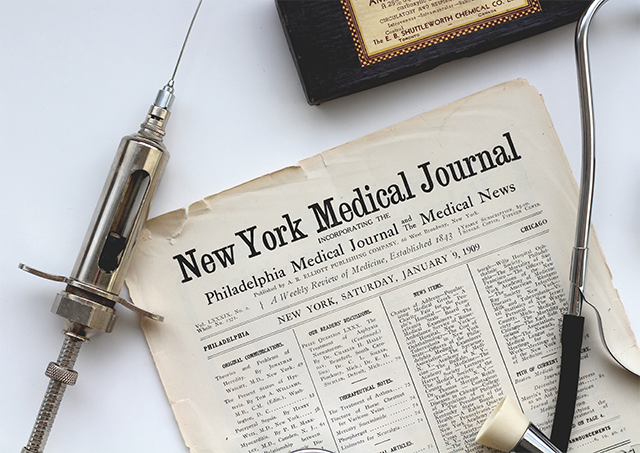
Explore medical history at the first annual History of Medicine event March 15, 2017.
As the saying goes, "those who don't learn history are doomed to repeat it." Dawna Gilchrist, professor emerita, Faculty of Medicine & Dentistry, has set out to ensure that doesn't happen in medicine.
"It's important to appreciate medical history, to look at it in its totality, the good and the bad, and interpret it critically," says Gilchrist. "It gives us insight into the future of our practice."
Gilchrist is the physician and history advocate behind the first annual History of Medicine Event taking place at the University of Alberta on March 15, 2017. The event showcases different perspectives and aspects of medical history. If history sounds dry to you, don't worry about dozing off during this event. The evening will take a fascinating look at the sometimes unexpected and overlooked aspects of medical history that shape our health care system today. It's sure to make the public more aware of medical history, and inspire current and future physicians.
This free event features Susan L. Smith, professor of History and Classics at the University of Alberta and author of Toxic Exposures: Mustard Gas and the health consequences of World War II in the United States. Smith's novel reveals the shocking story of how the United States and its allies intentionally subjected thousands of their own service men to poison gas as part of their preparation for chemical warfare.
Guest speakers including Gilchrist and FoMD historian Amy Samson will round out the event.
Samson will tell the story of a donation that the University of Alberta School of Medicine received from the Rockefeller Foundation in 1920, and the subsequent impact it had on medical innovation. The donation has resulted in many research breakthroughs and medical firsts at the University of Alberta. According to Samson, history can make valuable contributions to medical knowledge, which itself is a product of social, political and economic processes.
"History offers perspectives on the causes of health inequalities, and the changing definitions and social meaning of disease. It can also foster an understanding that the roles of physicians and the social contexts in which they practice change over time," says Samson. "It provides opportunities for critical reflection, creating a greater appreciation for the past that can help inform contemporary decisions."
This event is supported by the Dean's Initiative in The History of Medicine.
Event details:
Wednesday, March 15, 2017
Admission is free, everyone is welcome
7:00 p.m. to 9:30 p.m.
ECHA 2-190, Edmonton Clinical Health Academy, University of Alberta
11405 87 Avenue, Edmonton
Featuring Susan L. Smith, Author of Toxic Exposures: Mustard Gas and the health consequences of World War II in the United States, Professor, History & Classics, University of Alberta
With guest speakers:
Dawna Gilchrist, Professor Emerita, Faculty of Medicine & Dentistry, University of Alberta
Letitia Johnson, MA candidate, History & Classics, University of Alberta
Amy Samson, PhD, Historian, Faculty of Medicine & Dentistry, University of Alberta
"It's important to appreciate medical history, to look at it in its totality, the good and the bad, and interpret it critically," says Gilchrist. "It gives us insight into the future of our practice."
Gilchrist is the physician and history advocate behind the first annual History of Medicine Event taking place at the University of Alberta on March 15, 2017. The event showcases different perspectives and aspects of medical history. If history sounds dry to you, don't worry about dozing off during this event. The evening will take a fascinating look at the sometimes unexpected and overlooked aspects of medical history that shape our health care system today. It's sure to make the public more aware of medical history, and inspire current and future physicians.
This free event features Susan L. Smith, professor of History and Classics at the University of Alberta and author of Toxic Exposures: Mustard Gas and the health consequences of World War II in the United States. Smith's novel reveals the shocking story of how the United States and its allies intentionally subjected thousands of their own service men to poison gas as part of their preparation for chemical warfare.
Guest speakers including Gilchrist and FoMD historian Amy Samson will round out the event.
Samson will tell the story of a donation that the University of Alberta School of Medicine received from the Rockefeller Foundation in 1920, and the subsequent impact it had on medical innovation. The donation has resulted in many research breakthroughs and medical firsts at the University of Alberta. According to Samson, history can make valuable contributions to medical knowledge, which itself is a product of social, political and economic processes.
"History offers perspectives on the causes of health inequalities, and the changing definitions and social meaning of disease. It can also foster an understanding that the roles of physicians and the social contexts in which they practice change over time," says Samson. "It provides opportunities for critical reflection, creating a greater appreciation for the past that can help inform contemporary decisions."
This event is supported by the Dean's Initiative in The History of Medicine.
Event details:
Wednesday, March 15, 2017
Admission is free, everyone is welcome
7:00 p.m. to 9:30 p.m.
ECHA 2-190, Edmonton Clinical Health Academy, University of Alberta
11405 87 Avenue, Edmonton
Featuring Susan L. Smith, Author of Toxic Exposures: Mustard Gas and the health consequences of World War II in the United States, Professor, History & Classics, University of Alberta
With guest speakers:
Dawna Gilchrist, Professor Emerita, Faculty of Medicine & Dentistry, University of Alberta
Letitia Johnson, MA candidate, History & Classics, University of Alberta
Amy Samson, PhD, Historian, Faculty of Medicine & Dentistry, University of Alberta